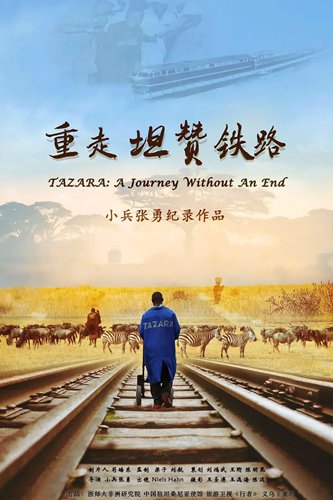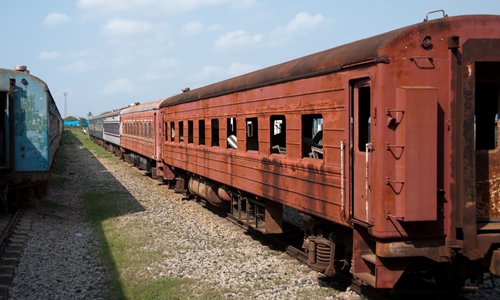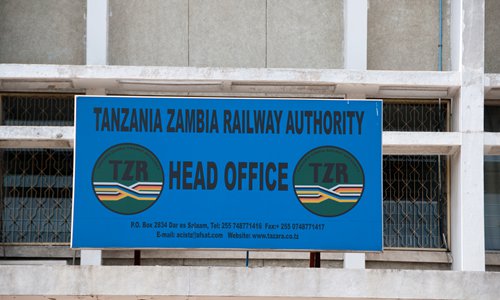HOME >> ARTS
TAZARA documentary reaffirms China-Africa relations
By Chen Xi Source:Global Times Published: 2019/11/7 17:20:29

Poster for TAZARA: A Journey Without An End Photo: Courtesy of Zhejiang University Press

The departure station for the TAZARA railway in Dar es Salaam, Tanzania Photos: IC

A sign for the head office of the TAZARA railway Photo: IC
"I remember when I was a little boy, there was a railway passing through my hometown. The whistle of the train was the rhythm of my childhood… TAZARA realized my dream. Thank you, railway of freedom…" these lyrics touch the inner hearts of many people in Tanzania, Zambia and China.
The lyrics come from main musical theme for Tazara: A Journey Without An End, a documentary series produced by four institutions including the Chinese Embassy in Tanzania and the Institute of African Studies at Zhejiang Normal University. The series is composed of three episodes in total: A Railway of Friendship, The Life Line and Love for TAZARA. Center for African Film and TV Studies has produced many versions of the series including a Chinese extended version and an English version. The Chinese version debuted on the China Global Television Network (CGTN) on September 1, and will be available on Chinese streaming platform iQiyi on November 15.
Together with the documentary, a book The Story of the Tanzania-Zambia Railway was published by Zhejiang University Press in October, providing more detailed information about this railway of friendship.
Varied perspective
As China's first foreign aid project led by then Chairman Mao Zedong, the TAZARA railway was built by Chinese workers to aid Tanzania and Zambia in the 1970s. It runs through Tanzania and Zambia with a total length of 1,860.5 kilometers.
"We all want to see a better Africa. We all want to see a free Africa. We all want to see an end of colonialism. The Chinese government, the Chinese people committed themselves in words, in deed and in action to support the liberation struggle," said Salim Ahmed Salim, former prime minister of Tanzania (1984-85), in the documentary.
"The documentary not only shows the real face of the TAZARA railway, but also marks the 55th anniversary of the establishment of diplomatic relations between China and Tanzania. The TAZARA railway was built by China, Tanzania and Zambia, and should be documented by the three countries not others," said Liu Hongwu, dean of the Institute of African Studies Zhejiang Normal University, during a seminar at the Tanzania Embassy in China on October 31.
"I feel very disappointed in and even angry at African Railway, the BBC documentary," Zhang Yong, director of TAZARA: A Journey Without An End, told the Global Times on Tuesday when discussing the 2010 BBC documentary from British filmmaker Sean Langan.
Zhang said that the image of the Chinese employees in the BBC documentary is incomplete, and noted that he suspects that the British interviewer was carrying a hidden camera and filmed the Chinese without their knowledge when talking to them.
"Filming a documentary without getting permission from the interviewee is disrespectful to that person and is also a violation of professional ethics," Zhang explained.
Zhang also pointed to one video clip in the BBC documentary in which an interviewed man claimed that the TAZARA railway "belonged to China."
"This is a huge joke because the ownership of the railway has always belonged to Tanzania and Zambia. The BBC documentary showed such an absurd mistake to the public, which makes one wonder about the BBC's unfriendly intentions to smear China-Africa relations."
Compared to the controversial BBC document, TAZARA: A Journey Without An End presents a more diverse perspective by forming a team of television producers, scholars and experts from Africa, Europe and China. Meanwhile, the narrative is smoother and more acceptable to Africans, according to Zhang.
"We invited a Dane to be the interviewer to add the perspective of a white European because he is engaged in Central African studies, could speak Swahili and used to work in Tanzania. We also think the Nordic ideology is more neutral than the people in Western Europe and the US," Zhang said.
Sacrifice and selflessness
In 1970, China was struggling with poverty, but the Chinese government still dispatched 50,000 Chinese railway workers to Africa and spent six years completing the huge project. The railway is regarded as a monument to the friendship between China and Africa that has greatly benefited local people.
Hua Yifei, a Chinese electrical engineer who worked in a railroad tie factory in Tanzania for almost 20 years, told the Global Times on Thursday that many of his local colleagues used to live in sod houses and went to work by bicycle, but now they live in brick houses and drive motorcycles or even cars.
"The locals are friendly to Chinese. They see us as their good friends," he said.
Hua and his Chinese colleague Feng Yuhua were very pleased to see the big changes in Tanzanian life, but on the other hand, they could not help missing their families.
"I came to Tanzania when my daughter was in high school, and because we could only return home once every two years, I could not see her and my wife very often…" said Feng, as he choked back tears.
"My motherland put her trust in me to work there, and I had the duty to do my job well. I am proud to be a Chinese," Feng said.
Hua said he started to work in Tanzania in 2001, and could only make a phone call to his family from the town center where he lived.
"I remember that the phone fee was super expensive, about $1 per minute. Later, we began to use software including QQ and WeChat to connect with our families," he explained.
"We are very grateful that China saved its neighbor country even when China was in poverty, and the best way we thank them is to live up to the confidence they have in us," said Mbelwa Kairuki, Tanzanian ambassador to China.
Newspaper headline: Railway of friendship
Posted in: TV,CULTURE & LEISURE